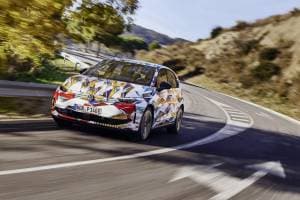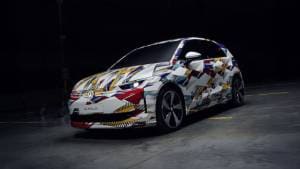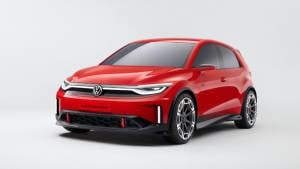Indian cars fail crash test: Maruti Suzuki Alto, Tata Nano, Ford Figo, Hyundai i10 not safe for you
Some of the most popular small cars in India have failed the crash tests conducted by Global NCAP, an independent UK-based charity that carries out consumer orientated vehicle safety initiatives.
In the first-ever independent crash tests conducted on Indian vehicles, most small cars showed high risk of life threatening injuries in road crashes. "All the cars selected by Global NCAP for testing in a frontal impact at 64kmph received zero-star adult protection ratings," the report said.
The models tested included the Suzuki-Maruti Alto 800, which is India's best-selling car, Tata Nano, Ford Figo, Hyundai i10 and Volkswagen Polo. The NCAP first chose the entry-level versions of each model, none of which were fitted with airbags as standard. These cars form a fifth of the total passenger vehicle sales in India.
After the tests, Volkswagen Polo has made twin front airbags standard across its entire range. When it was tested again with twin-front airbags it passsed with a four-star rating.
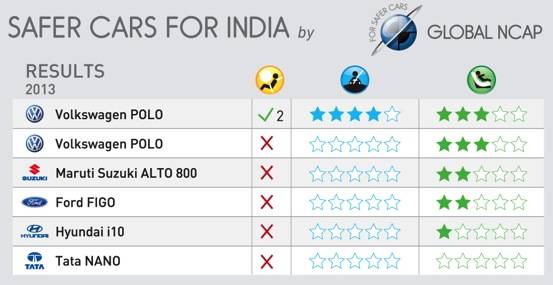 VW Polo's base model initially failed the test. But during the cours of the tests, VW made airbags standard across its Polo range, and subsequent tests earned it 4-star safety
VW Polo's base model initially failed the test. But during the cours of the tests, VW made airbags standard across its Polo range, and subsequent tests earned it 4-star safety
The report added that in the Suzuki-Maruti Alto 800, the Tata Nano and the Hyundai i10, the extent of the structural weaknesses were such that even fitting airbags would not be effective in reducing the risk of serious injury.
The Ford Figo and Volkswagen Polo had structures that remained stable, and, therefore, with airbags fitted, protection for the driver and front passenger would be much improved.
Most models fail UN's basic crash test
Global NCAP also assessed the same models against the UN's basic crash test. This 40% offset frontal impact test at 56kmph is now widely applied by major manufacturing countries and regions, including Australia, China, European Union, Japan and Malaysia. However, India is yet to implement it. All but one of the cars tested failed to pass even this minimum UN safety standard.
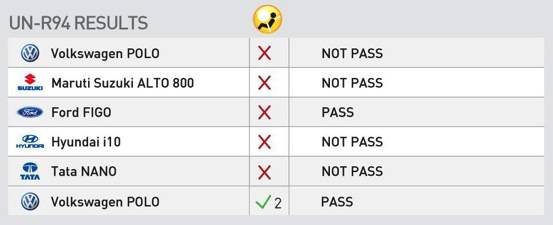 While the Ford Figo cleared the test based on the dummy crash reading, it is marked failed here because of the absence of airbags
While the Ford Figo cleared the test based on the dummy crash reading, it is marked failed here because of the absence of airbags
In a separate child safety rating, the child seats recommended by manufacturers were often found to be incompatible with their vehicle's belt system. Here again, Polo's base model initially failed the test, but when it was tested again with the newly introduced twin airbags, it cleared the test.
Global NCAP's comments on individual vehicles' adult protection
Suzuki-Maruti Alto 800
Zero-star
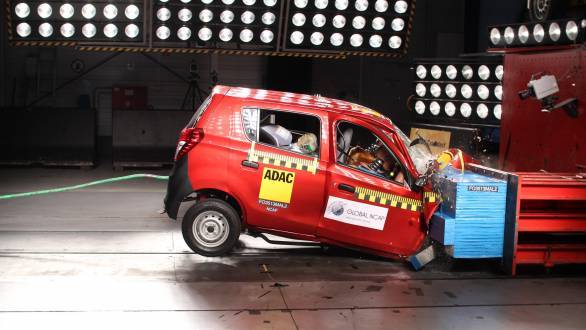
64kmph test: The vehicle structure was rated as unstable, increasing the risk of life-threatening injuries and making the car unsuitable for the fitment of airbags.
Child safety: Using the child seats recommended by Suzuki-Maruti, the Alto 800 achieved a two-star rating for child protection.
UN minimum safety standard: The Alto 800 fails to meet the UN's minimum safety requirements in the 56kmph crash test.
Tata Nano
Zero-star
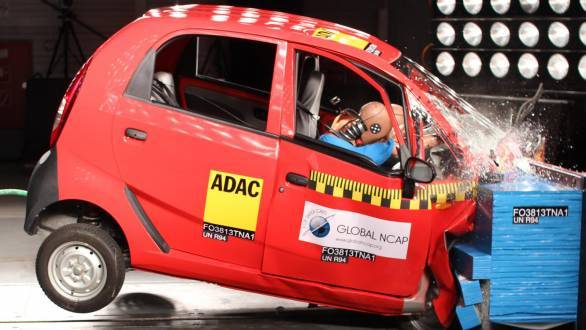
64kmph test: The vehicle structure was rated as unstable, increasing the risk of life-threatening injuries and making the car unsuitable for the fitment of airbags.
Child safety: The car achieved a zero-star rating for its child protection as it was not possible to install child seats in the car.
UN minimum safety standard: The Nano was not able to meet the UN's minimum safety requirements in the 56km/h crash test.
Hyundai i10
Zero star
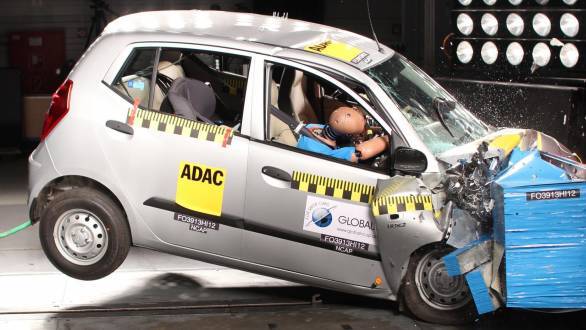
64kmph test: The vehicle structure unstable, increasing the risk of life-threatening injuries.
Child safety: Using the child seats recommended by Hyundai, the i10 achieved a one-star rating for child protection. The three year-old dummy indicated a high risk of serious injury.
UN minimum safety standard: The i10 was not able to meet the UN's minimum safety requirements in the 56kmph crash test.
Ford Figo
Zero-star
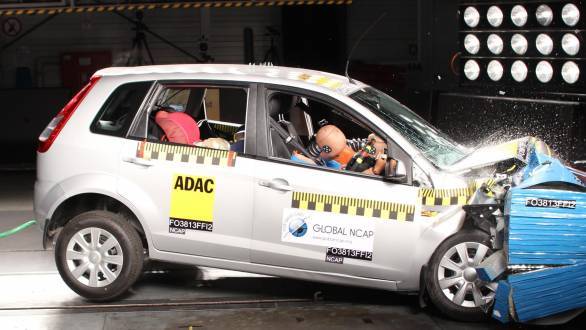
64kmph test: The vehicle structure was rated as stable, but without safety equipment such as airbags, too much of the crash energy was absorbed directly by the occupants.
Child safety: Using the child seats recommended by Ford, the car achieved a two-star rating for its child protection.
UN minimum safety standard: The Figo was able to meet the UN's minimum safety requirements in the 56kmph crash test. But only because the dummy's head narrowly avoided hitting the steering wheel directly and survived despite not having a driver airbag.
Volkswagen Polo
Zero-star
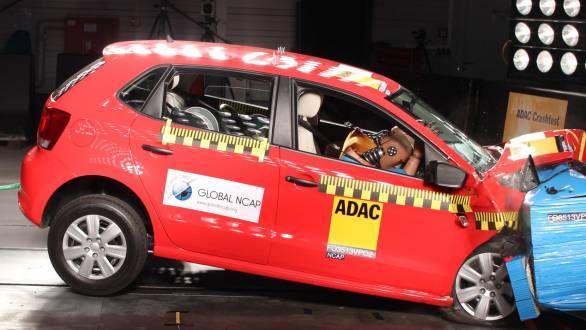
64kmph test: The vehicle structure was stable, but without safety equipment such as airbags, dummy readings indicated a high risk of life-threatening injuries.
Child safety: Using the child seats recommended by Volkswagen, the Polo achieved a three-star rating for child protection.
UN minimum safety standard: Without airbags, the Polo was not able to meet the UN's minimum safety requirements in the 56km/h crash test.
New VM Polo with airbags
4-star
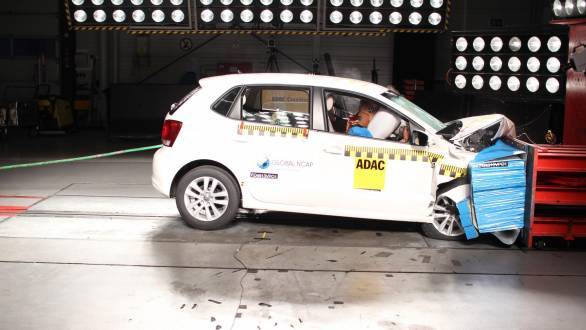
With two airbags (driver and front passenger), the Volkswagen Polo achieved a four-star rating for adult occupant protection in the 64kmph NCAP test. Thanks to the airbags, the protection offered to the driver and passenger head and neck was good.
Starts Rs 7.75 Lakhs
1194cc
Automatic
96
119
16 Kmpl
Starts Rs 6.17 Lakhs
999cc
Automatic
110
175
16.47 Kmpl
